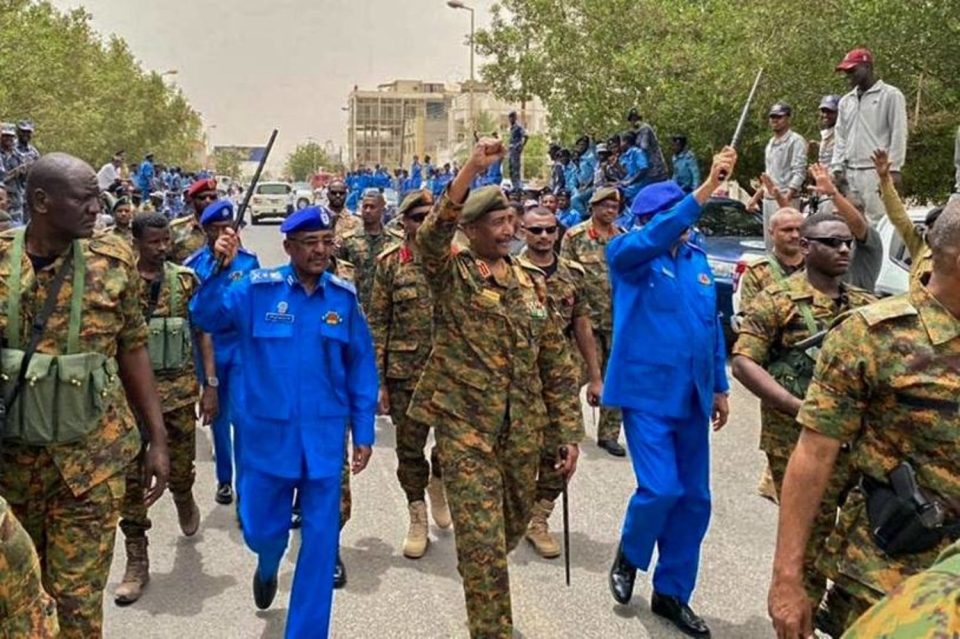Al-Burhan
The Sudanese Army Commander, Lieutenant General Abdel Fattah Al-Burhan, announced the dissolution of the Rapid Support Forces immediately after US sanctions on some leaders in these forces to suggest harmony with Washington, or that it supports him, at a time when the army commander’s isolation increased internally after the loss of important battles and the defection of military leaders and officers from the… The army and armed factions and tribes joining the Rapid Support Forces.
Deputy Commander of the Rapid Support Forces, Abdul Rahim Dagalo, revealed on Thursday that the sanctions imposed on him were “unfair… and an unfair decision,” and that “America took this measure without a clear investigation.”
The United States said on Wednesday that these sanctions were due to “acts of violence and human rights violations committed by its forces during their conflict with the Sudanese army.”
US Ambassador to the United Nations Linda Thomas-Greenfield announced the sanctions against Dagolo, brother of the commander of the Rapid Support Forces, Mohamed Hamdan Dagolo (Hemedti), during a trip to Chad’s border with Sudan to meet refugees fleeing ethnic and sexual violence.
Al-Burhan took advantage of the move and strived to employ it politically a few hours after it was announced. He issued constitutional decrees abolishing the RSF law and formally dissolving it, accusing it of “rebellion against the state and its involvement in committing violations against civilians,” in conjunction with the war it is leading against the army.
The Rapid Support Forces downplayed Al-Burhan’s step because he does not have the constitutional and legal legitimacy to solve it, as he is the one who turned against power and exercises powers that are not within his competence.
The army commander wanted to influence the morale of the Rapid Support Forces soldiers after their success in attracting a large number of officers and soldiers in the Sudanese army, hoping that this decision would change the positions of some regional and international forces that adhere to dealing with the two parties on an equal footing.
And the army commander continues his foreign tours, as he went Thursday to Qatar, after two visits to Egypt and South Sudan, to convince the countries he visits that he is the first ruler of the country.
Observers say that the position of the United States was prompted by UN reports that warned of the danger of spreading chaos in the Darfur region, and accused Abdel Rahim Dagalo knowing that the region is rife with violations by the army forces, as well as many armed groups that engage in acts of violence that are difficult to count.
They add that the sanctions are ineffective, and it is difficult to prove the charges against Daglo, wondering if the US administration will impose sanctions on leaders in the Sudanese army because of its crimes, especially in Darfur.
It is difficult to impose sanctions on Dagalo or the decision to dissolve the Rapid Support Forces to change the balance of the current war. Al-Burhan has lost all of his political capabilities that brought him to this position since his military coup against the civilian government in October 2021.
Advisor to the Commander of the Rapid Support Forces, Mustafa Muhammad Ibrahim, confirmed in media statements that “Burhan’s decision will not affect us politically or militarily, and we will continue our battles against the army.”
Director of the Institute of Strategic Studies and International Relations in Sudan, Salah al-Din al-Duma, pointed out that Al-Burhan’s decision is new evidence of “the confusion and confusion that dominate the army leadership, and the lack of a clear vision for dealing with the support forces.”
He added in a special statement to Al-Arab that the decision was not issued by Al-Burhan directly, but it expresses the tendencies of the dissolved National Congress Party and the deep state that owes allegiance to the Bashir regime, and that the issuance of the decision five months after the start of the conflict indicates that General Al-Burhan has become “robbed.” willpower and suffers from a loss of political awareness.”
Al-Duma pointed out that “the Sovereignty Council does not have the authority to take a decision to dissolve the Rapid Support Forces, just as the council did not convene to take such a decision, and if it convenes, it must send a proposal to the legislative authority (which does not exist now) that has the right to ratify the matter.” The decision, amending it, or rejecting it,” stressing that Al-Burhan “is facing the crisis of recognition as head of the Sovereignty Council and his government by the Jeddah Platform, which considers him a party to the conflict.”
In 2017, the Parliament of the regime of former President Omar al-Bashir approved the Rapid Support Forces Law as a support force for the army, subject to the Armed Forces Law, and directly reporting to the Presidency of the Republic.
After the fall of Omar al-Bashir’s regime in 2019, Al-Burhan made fundamental amendments to the law by abolishing Article 5, which indicates that it is a force governed by the Armed Forces Law, making it an independent force from the army.
On the fourteenth of last May, he issued a decision to freeze the accounts of the Rapid Support Forces in all the country’s banks and their branches abroad, and on the nineteenth of May, he relieved its leader of his position as Vice President of the Sovereignty Council and appointed in his place the head of the Popular Movement – North, Malik Aqar, despite the freeze of the document. Constitutionalism
alarab-co-uk


